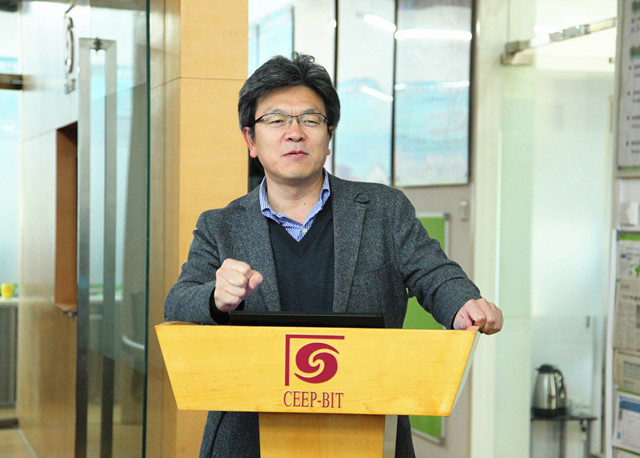

On November 14, 2016, Prof. Jun-yi Zhang from Hiroshima University, gave a report entitled “Population migration and regional development in Japan: A longitudinal and spatially context- dependent” at CEEP-BIT. The report was hosted by associate professor Bi-ying Yu, some other teachers and students attended the report.
Prof. Zhang began his report with a discussion about national land use of Japan, he said that Japan has been facing with population decline. Over-concentration of population in the three mega-city areas (Tokyo, Nagoya and Osaka) has resulted in seriously-unbalanced regional development, especially in a large proportion of local cities and rural areas. Since 1980s, the Japanese government has implemented various policies (i.e., a huge amount of money has been invested) in re-balancing regional development. Unfortunately, effects of such policies are not so effective as expected. This lecture focused on population migration among regions in Japan.
Prof. Zhang illustrated the patterns of population migration over time since 1980s, and then clarified temporally-changing effects of various regional revitalization policies by building a spatially context-dependent discrete choice model at the prefecture level. Also he summarized what policies had worked consistently over time and what policies worked only at a certain time period. Finally, he discussed the future research challenges. Prof. Zhang is interested in transportation planning and management, urban and regional planning, environmental & energy policy, tourism policy and management. He is the founder of citizens living behaviors, and the first foreign professor in transportation for Japan. He has participated many major projects as a leader and published more than 300 papers up to February, 2016. He is the reviewer for more than 20 SCI/SSCI journals and one of directors of IATBR, also the editor of Asian Transport Studies and the member of the editorial board for more than 10 international journals.
After this lecture, teachers and students from CEEP-BIT had a heated discussion with Prof. Zhang and had a picture taken together.